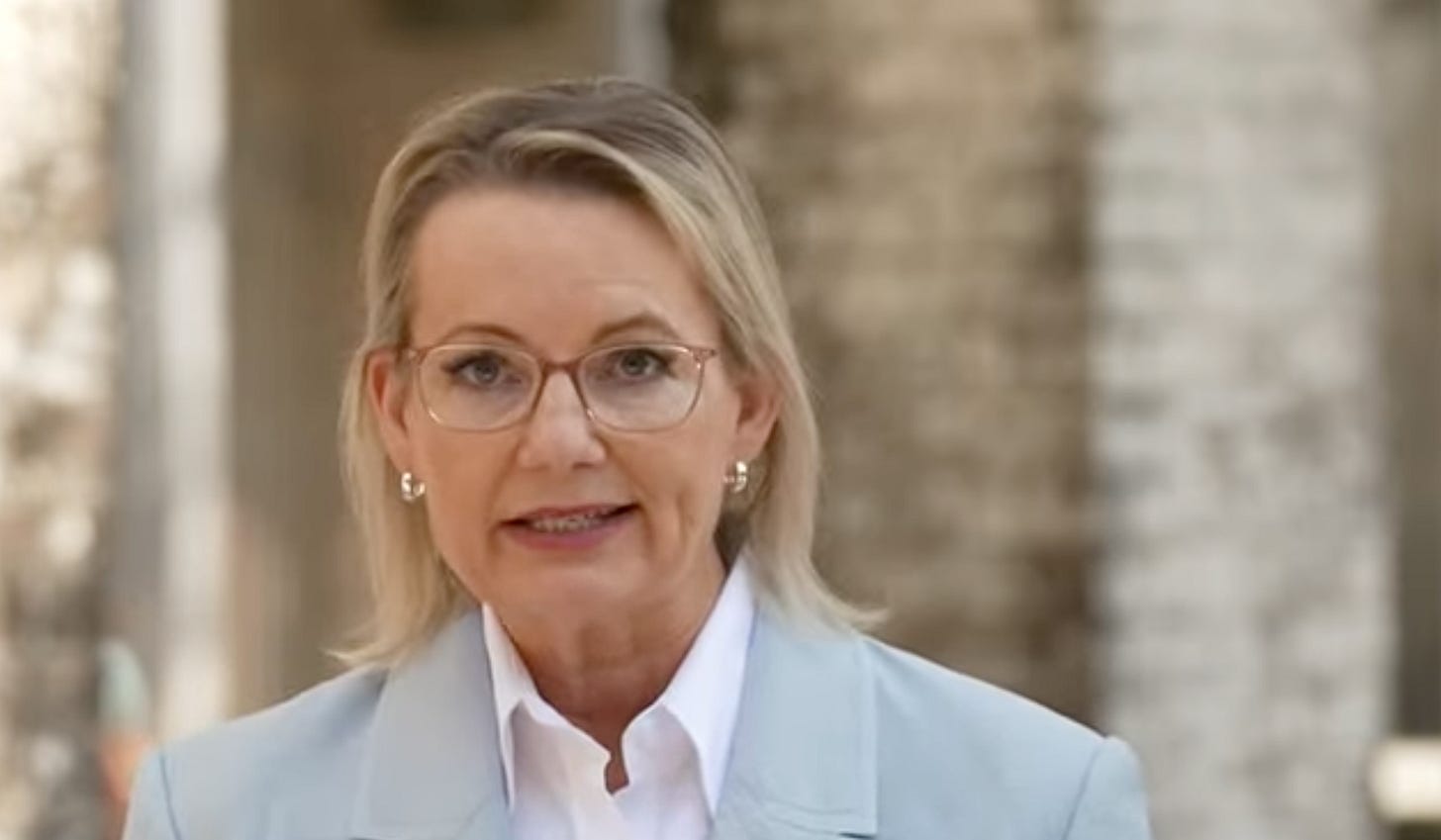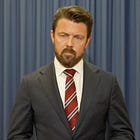Opposition Leader Calls Rudd’s Position “Untenable” After Trump Rebuke at White House
This piece is freely available to read. Become a paid subscriber today and help keep Mencari News financially afloat so that we can continue to pay our writers for their insight and expertise.
Today’s Article is brought to you by Empower your podcasting vision with a suite of creative solutions at your fingertips.
Opposition Leader Sussan Ley declared Australian Ambassador to the United States Kevin Rudd’s position “not tenable” following a tense exchange at the White House where President Donald Trump appeared not to recognize the diplomat and Prime Minister Anthony Albanese laughed at the president’s criticism.
Ley told ABC News Tuesday morning that the ambassador’s relationship with Trump had become compromised to the point where it threatened Australia’s national interests in securing trade concessions and strengthening the bilateral relationship.
“The elephant in the room was Kevin Rudd, and to be rebuked by the President, who didn’t even seem to know the ambassador to Australia and then have your own Prime Minister laughing along was a bit unfortunate and I don’t think the ambassador’s position is tenable now,” Ley said during an interview following Monday’s Trump-Albanese summit.
The opposition leader criticized Albanese’s response to Trump’s remarks about Rudd, suggesting the prime minister should either defend his ambassador or replace him.
“The Prime Minister can either back in the ambassador or sack him, because the relationship is vital,” Ley said during a separate press conference in Sydney. “And the next steps, whether it be AUKUS, whether it be ongoing work in tariffs, higher profile for the Quad or all of the other issues that may come to pass in what is our most important relationship.”
Truth matters. Quality journalism costs.
Your subscription to Mencari directly funds the investigative reporting our democracy needs. For less than a coffee per week, you enable our journalists to uncover stories that powerful interests would rather keep hidden. There is no corporate influence involved. No compromises. Just honest journalism when we need it most.
Not ready to be paid subscribe, but appreciate the newsletter ? Grab us a beer or snag the exclusive ad spot at the top of next week's newsletter.
Presidential Exchange Draws Scrutiny
During the Oval Office meeting Monday, Sky News political editor Andrew Clennell questioned Trump about the nine-month delay in meeting Albanese, specifically referencing Rudd’s past critical comments about the president, climate change policy differences and Australia’s recognition of Palestinian statehood.
Trump responded only to the ambassador question during the exchange, according to broadcast footage. The president’s apparent lack of familiarity with Rudd and subsequent criticism prompted laughter from Albanese, a moment Ley characterized as damaging to Australia’s diplomatic posture.
“I just invite everyone to observe the sharp exchange that took place and make their own conclusions, as I think many of us have, which is that the President didn’t appear to know the ambassador and after sledging him in the way that he did, then for the Prime Minister to actually laugh at that sledge in front of everyone at that table shows me that the relationship is not where it needs to be,” Ley said.
Tariff Deal Concerns
Ley emphasized that Australia failed to secure tariff reductions for steel and aluminum industries during the White House summit, contrasting the outcome with a recent U.S.-U.K. agreement that reduced tariffs by 50%.
“We welcome the initial commitments around critical minerals. We haven’t secured tariff reductions, which is really important for our steel and aluminium industries, Emma, and the relationship between the US and the UK was able to do exactly that, and those tariffs were reduced by 50%,” Ley told ABC News.
She suggested the critical minerals framework, worth $8.5 billion in combined U.S.-Australia commitments, could have been leveraged to secure tariff concessions affecting 200,000 Australian jobs.
“200,000 jobs, 200,000 families were looking to see what the consequences of this conversation was for them. And right now, there isn’t a deal on tariffs. Other countries have made that deal. We haven’t,” Ley said during her Sydney press conference.
The opposition leader characterized the meeting as falling short of expectations despite positive developments on AUKUS submarine program assurances and the critical minerals agreement.
“The failures in the relationship appear to mean that we don’t have the deal on tariffs that Australians would expect,” Ley said.
National Interest Focus
Ley framed her criticism around Australia’s strategic interests rather than Rudd as an individual, arguing that effective diplomatic representation requires trust and respect from the U.S. administration.
“This isn’t about the individual. This is about the relationship and it’s about Australia’s national interest. And we need everyone kicking goals every step of the way to make sure that our businesses and our industries are backed in exactly as they should be,” Ley said.
She noted the nearly year-long delay in arranging the bilateral meeting raised questions about whether sufficient groundwork had been completed to maximize outcomes from the summit.
“It’s taken almost a year to have this meeting. And I don’t know that the work has been done to secure, as I said, that commitment to a tariff deal that we really want to see in this country, profiling of the quad that’s important. There are a lot of issues in the relationship,” Ley said.
Critical Minerals Agreement Assessment
While acknowledging the critical minerals framework as a positive development, Ley criticized the government’s broader approach to resource sector investment and regulatory approvals.
“The critical minerals inking of the agreement is a good start, but this is a government that doesn’t welcome investment, doesn’t do approvals in the right way, and in fact has an investment pipeline that’s drying up, particularly in Western Australia,” Ley said.
She expressed concern that without improved energy policy and streamlined approval processes, the critical minerals commitments would fail to translate into operational projects.
“We have a government that has not backed in the resources sector in this country. It takes years and years to get approvals. It feels as if we’ve got a government that’s anti-business, that doesn’t understand that once that investment pipeline dries up, you’re in big trouble,” Ley said.
The opposition leader emphasized that successful implementation of the critical minerals framework requires affordable baseload energy for resource and processing operations.
“We need to see improvements in energy policy and every time you listen to a member of this government talk about their energy policy, it’s never with jobs, industries and manufacturing at the heart of it,” Ley said during her Sydney press conference.
AUKUS Submarine Program
Ley welcomed Trump’s assurances on the AUKUS submarine program, describing it as “business as usual” given her role in the cabinet that originally approved both Pillar 1 and Pillar 2 of the agreement.
“I was pleased to see the assurances on AUKUS. That’s business as usual. I was part of the Cabinet that approved AUKUS, both Pillar 1 and Pillar 2. There is a lot of work to do. It isn’t just about a friendly conversation, important though that is, and welcome though that is to us,” Ley said.
She characterized the AUKUS confirmation as expected rather than exceptional, suggesting the meeting should have produced more concrete deliverables beyond reaffirming existing commitments.
“To have the right words and the right framing around AUKUS, of course we welcome that. And a critical minerals deal? Well, it’s just the first step,” Ley said.
South China Sea Incident Response
Asked about the dangerous aerial encounter between a Chinese fighter jet and an Australian P-8 surveillance aircraft in the South China Sea, Ley called the incident “unprofessional and unacceptable” while pressing Albanese to leverage his relationship with Chinese President Xi Jinping.
“It’s the third such incident in recent months and it’s unprofessional and unacceptable to have one of our P-8s, that’s a derivative of the Boeing 737, which is a reconnaissance plane, just doing its job in military surveillance and to have a fast fighter jet come up alongside and then let go flares, which obviously have consequences for the pilots and the activity of flying the aeroplane safely, that’s just not good enough,” Ley said.
She called for direct prime ministerial intervention with Beijing over the Sunday incident.
“What needs to happen now is the Prime Minister needs to leverage the close relationship that he tells us he has with President Xi and actually make it very clear that this is not acceptable and report back to the Australian people with the response,” Ley said.
Coalition Energy Policy Development
Ley defended the coalition’s ongoing energy policy development process, now five months after the May election, saying all party room members from both Liberal and National parties remain involved in formulating the approach.
Asked about potential repeal of Australia’s net zero by 2050 laws while retaining Paris Agreement commitments, Ley declined to confirm specifics but emphasized the policy would prioritize stable grid infrastructure and affordable energy for businesses and households.
“People can suggest policies, and indeed I see that conjecture from time to time in the media, but our policy is under development, as I said, and we’re including everyone and every view,” Ley said.
She criticized the government’s energy policies as a “train wreck” while promising the coalition would deliver a comprehensive alternative focused on reliability and affordability.
“Right now, the energy policy of this country is being controlled by the Labor Party. And it is a disaster. And we will have a very strong alternative that demonstrates, as I said, the importance of a stable, reliable grid and affordable energy for businesses,” Ley said.
The ambassador controversy adds diplomatic complexity to Australia’s most important bilateral relationship as both nations navigate strategic challenges in the Indo-Pacific region and economic cooperation on critical supply chains.
Sustaining Mencari Requires Your Support
Independent journalism costs money. Help us continue delivering in-depth investigations and unfiltered commentary on the world's real stories. Your financial contribution enables thorough investigative work and thoughtful analysis, all supported by a dedicated community committed to accuracy and transparency.
Subscribe today to unlock our full archive of investigative reporting and fearless analysis. Subscribing to independent media outlets represents more than just information consumption—it embodies a commitment to factual reporting.
As well as knowing you’re keeping Mencari (Australia) alive, you’ll also get:
Get breaking news AS IT HAPPENS - Gain instant access to our real-time coverage and analysis when major stories break, keeping you ahead of the curve
Unlock our COMPLETE content library - Enjoy unlimited access to every newsletter, podcast episode, and exclusive archive—all seamlessly available in your favorite podcast apps.
Join the conversation that matters - Be part of our vibrant community with full commenting privileges on all content, directly supporting The Evening Post (Australia)
Catch up on some of Mencari’s recent stories:
It only takes a minute to help us investigate fearlessly and expose lies and wrongdoing to hold power accountable. Thanks!








